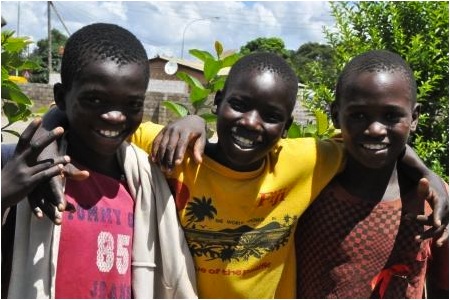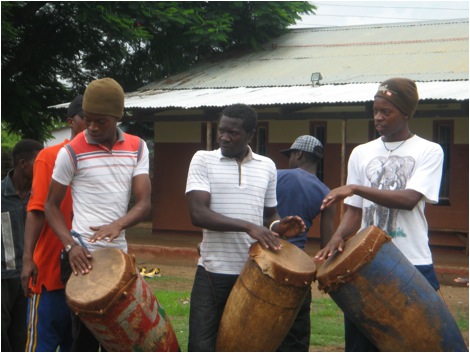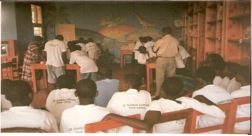Respecting the human dignity....of ALL children in Africa
 As you drive through most major urban centers in Africa, you are likely to encounter children living or working on the street. They beg for food, money or work. Most people shun them, mainly out of fear. After all, their clothes are ragged and dirty. And they are quite aggressive in their insistence for food or money.
As you drive through most major urban centers in Africa, you are likely to encounter children living or working on the street. They beg for food, money or work. Most people shun them, mainly out of fear. After all, their clothes are ragged and dirty. And they are quite aggressive in their insistence for food or money.
But if you look into their eyes, you might be surprised to see desperation, fear, and sadness. UNICEF estimates that as many as 10 million children live on the street or spend their days trying to make a living through begging or stealing. They often use drugs as a means of shoring up the courage to survive the life on the street. They experience a range of hardships that many of us cant truly imagine: hunger, illness, lack of water, violence, and whatever the weather brings. They often sleep in groups, huddled together as a way to find some level of protection.
They are easily exploited and often abused. Rejected or rendered invisible by many who pass by them, they develop a tough exterior. But at their core, like any other child, they long for belonging, love, and care from an adult.
On this day, the 21st commemoration of The Day of the African Child, the world’s focus is on the needs and rights of children living on the street.
The delicate and intricate work of reaching out to and facilitating the transition of children from a life on the street is not for the fainthearted. It requires great skill to penetrate the tough exterior of the young people and earn their trust in order to support and guide them through a process of transition to a different life. It takes courage, attention to details, and knowledge of street culture to find the right balance of love and respect, responsibility and accountability needed to make a difference.
And maybe, even more importantly, it takes the ability to respect the dignity of each child.
And that’s just the beginning.
Finding the family, understanding the underlying reasons for the separation from the family, takes time and patience. Rebuilding family bonds and communication is a delicate and complicated dance. Strengthening families is critical to successful reunification. (though at times it may be better for the young person to not be return to the family, but receive assistance to establish their own home). It also holds the key to preventing the migration of children to a life on the street.
A number of Firelight grantee partners take on this challenge every day. We recognize the work of three of them, Simukai Street Youth Program (Zimbabwe), Fountain of Hope (Zambia), and OPDE (Rwanda).
Their strength is their commitment to listening to the youth, paying keen attention to every detail, and continually adapting their programs to address the constellation of issues that make this process so challenging.
We salute them, and many others, for their great work to ensure that even the most marginalized children-and especially children living on the street-have the right to a life of dignity, respect and hope.
*******
Fountain of Hope’s night outreach program is the first point of contact and starting point for staff to build a relationship with youth living on the street. As the trusting relationship unfolds, each young person is invited to take the opportunity to transition from a hard life on the streets of Lusaka. A clinic, community school, transition home, and feeding program meet basic needs of youth. In their focus on developing the whole child, Fountain of Hope provides opportunities for creation through the arts: theater, music, art, and a library that boasts of a 4,000 volume book collection. Through these programs children find a safe space where they can demonstrate their leadership, find a creative outlet to express themselves, leading to a sense of hope, self-confidence, and connection.
Oeuvre Humanitaire pour la Protection et le Développement de l’Enfant en
Difficulté (OPDE) aims to reintegrate street children with their families while simultaneously supporting children’s academic, social, and professional reintegration. In recognition of the fact that many children end up on the street due to poverty, OPDE focuses on helping youth to develop skills that put them on track to financial independence. When OPDE realized that youth who return to their families become the breadwinners due to their skills, they decided to have each young person go through skills training alongside another adult family member. This not only reduces the strain of becoming the sole income earner, it also becomes an opportunity for family bonding. These small, thoughtful adjustments to their programs increase the success of OPDE’s work with youth.
Simukai’s rehabilitation centers offer food, academic and vocational training, counselling, and opportunities to socialize and play. Through their family reunification program, Simukai has learned more about what families need to stay together: parenting skills and economic resources. Always adapting their programs to better serve children, Simukai is strengthening vulnerable families in advance of children migrating to the streets. This kind of creative and comprehensive thinking about factors of vulnerability is a consistent element in Simukai’s programs.



